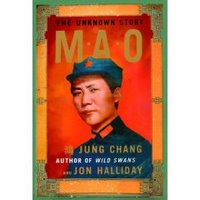Selfishness
 My daughter Lillie was taking notes during the sermon yesterday. I looked over and saw, in the adorable handwriting of a ten-year-old girl, these words: “Selfishness is the leading characteristic of the unregenerate.”
My daughter Lillie was taking notes during the sermon yesterday. I looked over and saw, in the adorable handwriting of a ten-year-old girl, these words: “Selfishness is the leading characteristic of the unregenerate.”That line jumped out at me because, as it happens, I’m currently reading a new book about a monster who could be the poster child for selfishness. In Mao: The Unknown Story, authors Jung Chang and Jon Halliday write: “Mao Tse-Tung, who for decades held absolute power over the lives of one-quarter of the world’s population, was responsible for well over 70 million deaths in peacetime, more than any other twentieth-century leader.”
By age 24, the authors say, Mao’s writings “expressed the central elements in his own character, which stayed consistent for the remaining six decades of his life and defined his rule. Mao’s attitude to morality consisted of one core, the self, ‘I,’ above everything else: ‘I do not agree with the view that to be moral, the motive of one’s action has to be benefiting others. Morality does not have to be defined in relation to others … People like me want to … satisfy our hearts to the full, and in doing so we automatically have the most valuable moral codes. Of course there are people and objects in the world, but they are all there only for me. … People like me only have a duty to ourselves; we have no duty to other people. … I am only concerned about developing myself … I have my desire and act on it. I am responsible to no one.’”
One has to admire his candor, I suppose. “Absolute selfishness and irresponsibility lay at the heart of Mao’s outlook,” the authors observe. Quite unlike a certain ten-year-old girl I know.